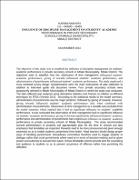Influence of discipline management on students’ academic performance in private secondary schools in Mbale municipality, Mbale district
Abstract
ABSTRACT
The objective of this study was to establish the influence of discipline management on students’ academic performance in private secondary schools in Mbale Municipality, Mbale District. The objectives were to establish how the; observance of time management influenced students’ academic performance, giving of rewards influenced students’ academic performance, and administration of punishments influenced students’ academic performance. The study employed a cross sectional survey design. Questionnaires were the main instruments of data collection in addition to interview guide and document review. Four private secondary schools were purposively selected in Mbale Municipality of Mbale District in which the study was conducted. The data collected was analyzed using descriptive statistics and Pearson co-relation co-efficient techniques by SPSS (Version 20.0). According to the statistical results in the model summary, administration of punishments was the major predictor, followed by giving of rewards. However, giving rewards influenced students’ academic performance only when combined with administration of punishments. Observance of time management as a variable was excluded from the model summary which implied that it had no significant influence on students’ academic performance. It was concluded that observation of time management had no significant influence on students’ academic performance; giving of rewards significantly influenced students’ academic performance and administration of punishments had a significant influence on students’ academic performance in private secondary schools of Mbale Municipality. The study recommended sschool administrators to properly and appropriately plan for the time in schools and also emphasize that timetables are respected. Rewards need to be more pronounced and given enough awareness so as to enable students comprehend them better. Head teachers should design proper ways of handling punishments. Disciplinary committees therefore need to engage students in dialogue rather than cruel punishments where need be in terms of decision-making and be given powers and authority to execute their duties. School timetables need to provide time for counseling and guidance to students so as to prevent occurrence of offences rather than punishing the offenders.
Collections
- Thesis and Dissertations [209]

